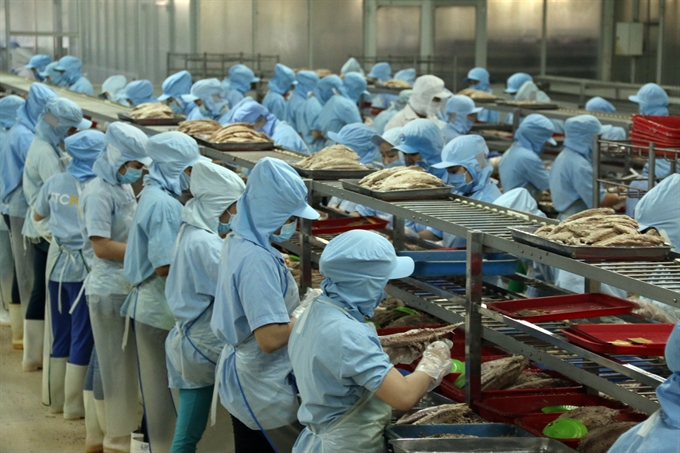 Economy
Economy

A minister said the British vote to leave the European Union (EU) would not have immediate impacts on Việt Nam, but long-term impacts must be taken into account.
 |
| Workers process canned fish for export in KTC Canned Foodstuff Manufactory in Kiên Giang Province. — VNA/VNS Photo Lê Huy Hải |
HÀ NỘI — A minister said the British vote to leave the European Union (EU) would not have immediate impacts on Việt Nam, but long-term impacts must be taken into account.
“We have preliminarily analysed how the Brexit influences the world and Việt Nam. The event is yet to have any significant impacts on Việt Nam,” Minister of Planning and Investment Nguyễn Chí Dũng said during a dialogue on investment policies in Hà Nội yesterday.
According to Dũng the UK and the EU are currently not very big partners in terms of trade and investment with Việt Nam. However, the Brexit will affect currency developments in many countries, including trade partners of Việt Nam, and thus affect the country in indirect ways.
Experts agreed with this point of view as they discussed the issue during an online talk held by investment forum BizLive yesterday.
Nguyễn Mai Phương, a director of analysis with brokerage firm VNDirect, pointed out that Việt Nam’s trade revenues with the UK accounted for 3-4 per cent of Việt Nam’s total foreign trade values.
The value of Vietnamese exports to the UK represented about 2.3 per cent of Việt Nam’s gross domestic product, according to another director of analysis, Nguyễn Đức Hùng Linh, from Sài Gòn Securities Inc.
Here are expert answers to some major questions discussed during the online round table:
How will Brexit affect Việt Nam’s finance and its foreign investment influx?
Võ Trí Thành, the former deputy director of the Central Institute for Economic Management (CIEM), said Việt Nam might face disadvantages in the trade balance because of possible depreciations in the currencies of a number of its trade partners.
But appreciations in some other currencies, such as the Japanese yen, would help improve the competitiveness of Vietnamese exports.
“UK direct investments in Việt Nam are not too great, but capital flows pouring into Việt Nam via the UK are significant. These inflows may slow in the short term due to the UK and EU’s struggling situation,” he said.
“Capital flows will also seek ‘safe havens’. If Việt Nam can prove a more stable economy and a better business environment, investors may be more interested in its market. This will depend on macro-policy responses and reforms of the country,” he added.
Lê Đăng Doanh, the former director of CIEM, said the announcement last week that the domestic stock market lost US$1.1 billion since the Brexit vote was quite a heavy loss.
Thành said that because foreign investors play an important role in the local stock market, the loss is “understandable”. After “overshooting” investors’ reactions, the market is likely to reach a new balancing point that is based on global economic developments and reforms.
What should Vietnamese policymakers do now?
“Macro policies must be more flexible, although it is not always easy to choose between policy flexibility and economic stability. The co-ordination of monetary and fiscal policies needs special attention, and assuring discipline in State budget operations is necessary for effective monetary policies,” said Thành.
“The market is interested in the European Union – Việt Nam Free Trade Agreement (EVFTA), whose progress is likely to slow,” said Cấn Văn Lực, a member of the National Financial and Monetary Advisory Council.
The top priority of the EU and the UK now is to deal with Brexit consequences, so Việt Nam will have more time for legal reviews with the EVFTA. Việt Nam may also negotiate an FTA with the UK, according to Lực.
In the meantime, the banking and finance sector should intensify risk management. “The Government should establish a derivatives market and use it as a tool to manage risks,” Lực said.
Banking expert Nguyễn Trí Hiếu said the State Bank of Việt Nam should closely observe fluctuations of the Chinese yuan for timely adjustments of the Vietnamese đồng, since China is the largest import market of Việt Nam.
What is the future for the ASEAN Economic Community (AEC), which was established just late last year?
Huỳnh Thế Du, Director of the Fulbright Economic Training Programme, said there are big gaps between Southeast Asian nations in their economic development levels. “It will take a very long time for the AEC to become lively,” he said.
Nguyễn Mại, Chairman of the Việt Nam Association of Foreign Invested Enterprises, reportedly told the dialogue on investment policies that members of the ASEAN community will have to work to reach a consensus on economic policies, especially those related to the law, taxes and administrative mechanism.
“This is needed for the region to avoid a ‘Brexit ASEAN,’” he said.
Nguyễn Bích Lâm, the head of the General Statistics Office, reportedly told a press conference yesterday that it would review UK investment projects in Việt Nam.
This agency would assess possible changes in investment policies when the UK exits the EU, and scrutinise taxes applied for relevant import and export goods, he said. — VNS




